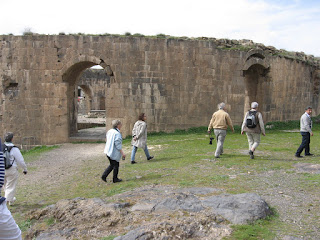Shahba (Arabic: شهبا / ALA-LC: Shahbā) is a city located 87 km south of Damascus in the Jabal el Druze in As-Suwayda Governorate of Syria, but formerly in the Roman province of Arabia Petraea. Known in Late Antiquity as Philippopolis (in Arabia), the city was the seat of a Bishopric, which remains a Latin titular see.
The oasis settlement now named Shahba had been the native hamlet of the Roman emperor Philip the Arab. After Philip became emperor in 244 CE, he dedicated himself to rebuilding the little community as a colonia. The contemporary community that was replaced with the new construction was so insignificant that one author states that the city can be considered to have been built on virgin soil, making it the last of the Roman cities founded in the East.
The city was renamed Philippopolis (a name with homonyms) in dedication to the emperor. A hexagonal-style temple and an open-air place of worship of local style, called a kalybe, a triumphal arch, baths, a starkly unornamented theatre faced with basalt blocks, a large structure that has been interpreted as a basilica, and the Philippeion surrounded by a great wall with ceremonial gates, were laid out and built following the grid plan of a typical Roman city.
Source: Shahba - Wikipedia
The oasis settlement now named Shahba had been the native hamlet of the Roman emperor Philip the Arab. After Philip became emperor in 244 CE, he dedicated himself to rebuilding the little community as a colonia. The contemporary community that was replaced with the new construction was so insignificant that one author states that the city can be considered to have been built on virgin soil, making it the last of the Roman cities founded in the East.
The city was renamed Philippopolis (a name with homonyms) in dedication to the emperor. A hexagonal-style temple and an open-air place of worship of local style, called a kalybe, a triumphal arch, baths, a starkly unornamented theatre faced with basalt blocks, a large structure that has been interpreted as a basilica, and the Philippeion surrounded by a great wall with ceremonial gates, were laid out and built following the grid plan of a typical Roman city.
The Philippeion, a memorial monument
The Roman Theatre
The Mosaic Museum
Source: Shahba - Wikipedia









































